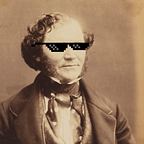Historians and the Culture Wars: History Reclaimed
In recent days, academic twitter, particularly the feeds and timelines of historians, has been abuzz regarding a new group: History Reclaimed. History Reclaimed, a blog created by a handful of historians (as well as other scholars), tells a familiar story. Professional, academic history has been overrun by illiberal, intolerant academics, bent on shouting down and silencing a marginalised and besieged sub-section of their colleagues. “Who are these poor, oppressed souls?”, I hear you cry. Well, Conservative historians harangued by the “woke” mob. These historians dare not, it is claimed, voice their views, except in hushed whispers in the corner of the senior common room, lest they be overheard by the Wokes’ Stasi-like informants. Such is the fear which stalks History departments, up and down the land.
This will be a familiar tale of woe to those who follow the culture wars within academia. For a silenced group, these scholars are a particularly noisy bunch. Several of the same individuals, for example, have been serving up largely the same complaints, regarding their silencing, from no lesser platforms than: the pages of the national press; in interviews with high-profile online commentators, and; on the website of Britain’s ruling political party, Conservative Home.
Emeritus Professor Robert Tombs recently complained that the current climate in academia requires that ‘dissent is to be suppressed’. A complaint difficult to take entirely seriously, given that it appears in the Spectator — the oldest weekly political magazine in the world. How is he being suppressed if he, unlike the vast majority of historians in the UK, has ready access to a major political magazine to air his grievances?
It is also not the case that the usual outlets for academic expression are closed to them. They have their book contracts; the opportunity to submit their ideas to established learned journals; their own journals; their own research projects; their own speaking events hosted by their universities. They list their impressive positions and links to among the most prestigious institutes of higher learning on Earth. Silenced? Excluded from the academy? Yeah, Riiight…
There is another problem. Where is the wider evidence of this suppression across Higher Education and in History Departments? For instance, Tombs claims that ‘no-platforming, censorship, intimidation, dismissal, even threats and actual violence’ are the tools of the Woke. This is a tangible claim, one which surely can be readily substantiated with concrete examples, studies and data? The kind of evidence-based approach to scholarly questions that History Reclaimed purports to like. Yet, oddly, Tombs doesn’t present any.
I was at least anticipating the reeling off of a handful of high-profile examples of this so-called academic ‘Cultural Marxist’ suppression. Such as those regularly used to (dubiously) generalise the views, actions and experiences of the approximately 440,000 academic staff in the UK (2018–2019 numbers). Yet, such arguments are driven by anecdotes but little more.
Thankfully, these questions of woke mobs silencing debate have been explored, not least by a parliamentary report, which found ‘A large amount of evidence suggests that the narrative that “censorious students” have created a “free speech crisis” in universities has been exaggerated.’ Yet Professor David Abulafia argues that his History Reclaimed group ‘aims to recover ways of looking at the past’ from ‘ideological distortions’ and that the way to do this is to return to an ‘empirical approach’. Yet History Reclaimed’s academics do not appear to wish to justify their own claims, regarding ‘woke academics’, via such an approach themselves. As such, it is difficult to take any of this particularly seriously.
Instead, it appears that the actual problem is that these historians want to have their cake and eat it too. They wish to put forth their problematic views on gender, race, imperialism and empire, but not see those views robustly criticised. They do not wish to deal with the fallout when their colleagues increasingly fail to take them seriously as scholars or wish to be associated with them. It is a failure to accept that while they are free to say what they like, so are the rest of us and that isn’t always going to be pleasant.
